FAA 2010 Lecture: Introduction to Solar Revolutions
$14.99
This short lecture introduces several solar revolution techniques, part of the Persian suite of annual predictive techniques: profections, the solar revolution chart, and transits. Length 1:08:57, 31MB.
You may also like…
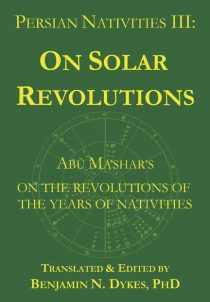
Persian Nativities III: On Solar Revolutions
This third volume of the Persian Nativities series is a translation of the surviving Latin version of Abu Ma’shar’s On the Revolutions of the Years of Nativities. It covers all of the primary predictive techniques: profections, solar revolutions, distributions, transits, and firdaria.
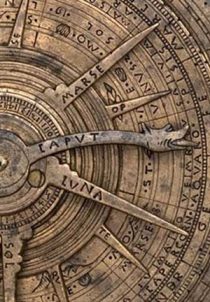
Workshop: Elements of Solar Revolutions
This 2.5-hour workshop shows in great detail how to understand and combine several traditional techniques for analyzing a native's chart from year to year, using solar revolutions (solar returns), profections, and the direction of the Ascendant of the solar revolution. Length 2:34:55, 71MB.
Related Products
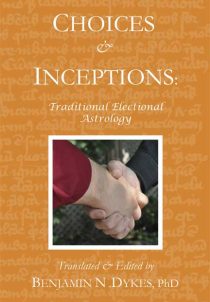
Choices & Inceptions: Traditional Electional Astrology
Medieval electional astrology in the tradition of Dorotheus
Choices & Inceptions presents numerous works on choosing auspicious times for actions, drawn from the most well-known medieval Persian and Arabic-language authors and compilers: al-Kindi, Sahl bin Bishr, Bethen, al-‘Imrani (Haly Embrany), and al-Rijal (Haly Abenragel). It is the largest collection of traditional electional texts available in modern languages.
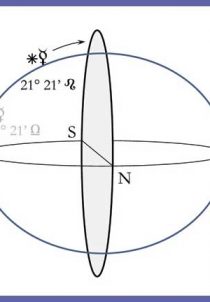
Primary Directions Without Tears
This audio download discusses how primary directions differ from other techniques like progressions, and completely explains how to calculate traditional directions using your astrology program’s animation function, illustrated with several chart example. Contains: MP3 and slides. Length: 1:45:00, 49MB.
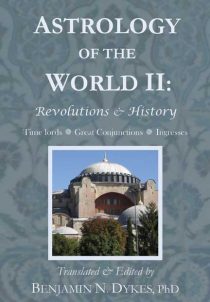
Astrology of the World II: Revolutions & History
Ingresses and conjunctional theory from the Persians
Astrology of the World II: Revolutions & History is the second in a trilogy of writings from medieval astrologers, focusing on astrological theories of history, mundane time lords and predictive techniques, Saturn-Jupiter conjunctions, and annual ingresses. Many texts have been translated directly from Arabic, and authors include Masha’allah, Abu Ma’shar, Sahl, ‘Umar al-Tabari and Kankah, al-Qabisi, and al-Rijal (Haly Abenragel).
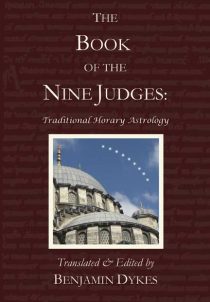
The Book of the Nine Judges
The great medieval compendium of Persian and Arabic masters
The Book of the Nine Judges is the largest traditional compilation of horary astrology, drawn from nine Persian and Arabic astrologers. Translated from Arabic sources chiefly by the 12th-Century Latin translator Hugo of Santalla, it achieved legendary status but has never before been translated into any modern language. It includes material by Masha’allah, ‘Umar al-Tabari, Abu Ma’shar, Sahl bin Bishr, al-Kindi, Abu ‘Ali al-Khayyat, “Dorotheus,” “Aristotle,” and Jirjis. Click here for a PDF excerpt.
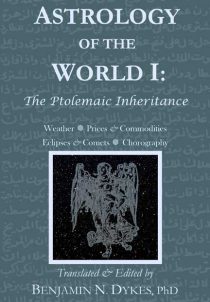
Astrology of the World I: The Ptolemaic Inheritance
Astrology of the World I: The Ptolemaic Inheritance presents numerous selections by Arabic and Latin authors on areas of mundane astrology inspired by Ptolemy’s Tetrabiblos. Many texts have been translated directly from Arabic by Benjamin Dykes. Authors include al-Kindi, ‘Umar al-Tabari, al-Rijal, Masha’allah, Abu Ma’shar, ibn Labban, Dorotheus, and ibn Ezra.
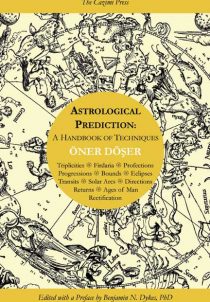
Astrological Prediction: A Handbook of Techniques
This new work by popular Turkish astrologer Öner Döşer embodies an important new trend in astrology: the harmonizing of traditional and modern techniques for contemporary astrologers. The traditional techniques here include: Ptolemy’s Ages of Man, triplicity periods, distributions or directions through the bounds, primary directions, profections, and firdaria. Contemporary techniques include secondary progressions, solar arcs, and transits. Click here for a PDF excerpt.
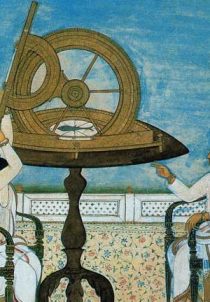
FAA 2010 Workshop: Special topics
This advanced workshop takes a tour through five special topics in traditional delineation and prediction: detriment and fall, aversion, bounds, stakes/angles and overcoming, and profession. Total length: 3:32:51, 48MB.
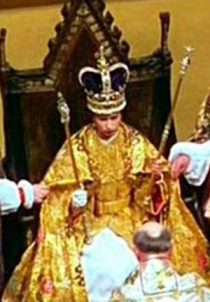
Eminence and Status in Traditional Astrology
This lecture describes numerous traditional techniques for evaluating eminence and status in a natal chart. All of the techniques are applied to two charts of famous individuals, Michael Jackson and Bill Gates. Length 2:33:00, 70MB.
